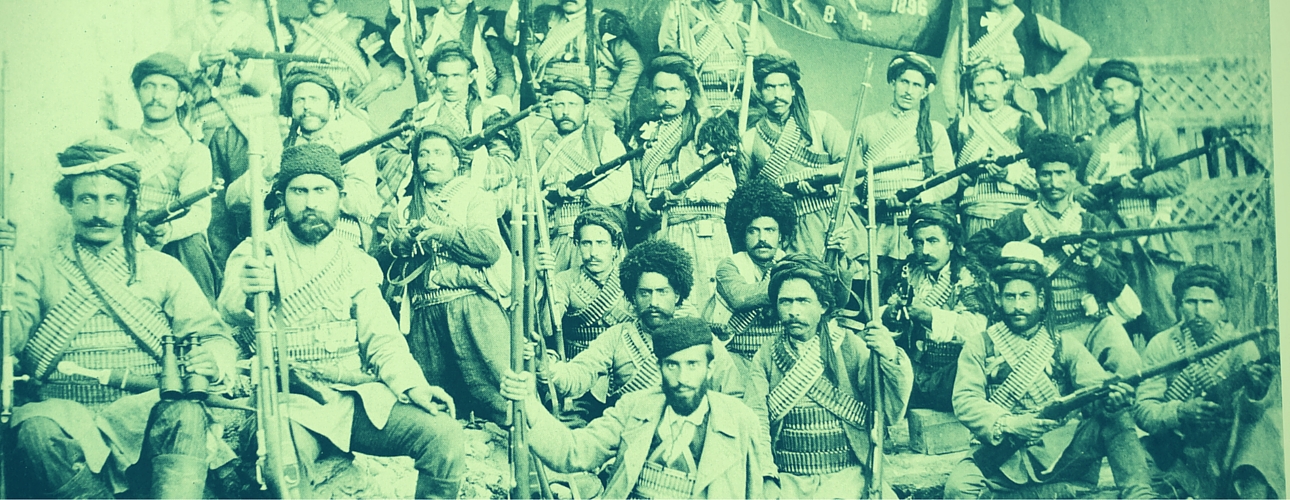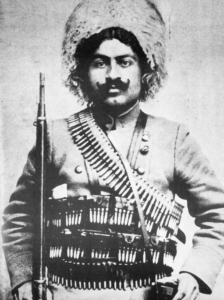
Garegin Nzhdeh [1886–1955]

Nzhdeh was born in the village of Kznout, in Nakhijevan, the youngest of four children. His father was the village priest. Nzhdeh received his early education at a Russian school in the city of Nakhijevan. He continued his education at the Tiflis Russian Gymnasium (high school), then attended St. Petersburg University. After two years of study at the Faculty of Law there, he returned to the Caucasus to join the Armenian national liberation movement against the Russian and the Ottoman Empires.
In 1906, Dashnaktsoutiun sent Nzhdeh to Bulgaria to attend military school. He graduated from the Sofia military academy in 1907. In 1908, he participated in the Iranian constitutional revolution alongside Rostom, Yeprem Khan, Mourad of Sepasdia, and other Armenian revolutionaries.
In 1909, Nzhdeh was arrested in the Caucasus by the Russian authorities and spent three years in prison but eventually managed to escape. In 1912, he joined Antranig’s Armenian battalion within the Macedonian-Adrianopolitan Volunteer Corps of the Bulgarian Army and fought against the Ottoman Empire in the Balkan wars, during which he was wounded.
Nzhdeh returned to the Caucasus in 1914–1915 to help in the formation of the Armenian volunteer regiments within the Russian army to fight against the Ottoman Empire. He was second in command to Dro, who commanded the Second Armenian Regiment. In 1916, Nzhdeh commanded a special Armenian-Yezidi military unit.
Nzhdeh played a key role in organizing the troops for the defense of Gharakilise in May 1918. After the declaration of the independent First Republic of Armenia, Nzhdeh was appointed governor of Nakhijevan. In August 1919, he was appointed commander of the Southern Corps of the Armenian army.
Following the Sovietization of Armenia in December 1920, the Bolsheviks proposed that Karabagh and Zangezour be granted to Soviet Azerbaijan. Nzhdeh, who vehemently opposed the idea, led the defense of Siunik region against the rising Bolshevik movement and declared Siunik’s autonomy.
After the February 1921 revolt against Soviet rule in Yerevan, the ARF controlled Yerevan and surrounding regions for some 42 days before being overwhelmed by numerically superior Red Army troops in April. The leaders of the rebellion then retreated into the Siunik region.
In April 1921, the independence of the self-governing region of Zangezour and surrounding areas was declared the Republic of Mountainous Armenia (Lernahayastani Hanrapetoutiun). Nzhdeh was proclaimed its prime minister and minister of defense.
After months of fierce battles with the Red Army, the Republic of Mountainous Armenia capitulated in July 1921, following Soviet Russia’s promises to keep the mountainous region a part of Armenia. Nzhdeh, his soldiers, and Armenian intellectuals, including leaders of the first Independent Republic of Armenia, crossed the Arax River into neighboring Iran. Soon thereafter, Nzhdeh returned to Sofia, Bulgaria, where he married a local Armenian woman and started a family.
Nzhdeh was involved in organizing the Armenian communities of Bulgaria, Romania, and the United States. In 1933, by decision of the ARF, Nzhdeh moved to the US to organize the youth. Assisted by Kopernik Tandourjian, Nzhdeh founded the Tseghagron movement, which soon became the Armenian Youth Federation (the ARF’s youth organization.)
In 1937, he returned to Bulgaria, where he published the Razmik Armenian newspaper and, along with a group of Armenian intellectuals in Sofia, founded the Taron Nationalist Movement and published its organ, the Taroni Artziv paper. He maintained close contacts with Macedonian Bulgarian revolutionary organizations.
During the Second World War, Nzhdeh attempted to gain the support of the Axis Powers (namely, Germany) as well as the Allied Powers (specifically, the Soviet Union) by proposing Armenian assistance in return for attacking Turkey. Convinced to travel to Moscow for talks, he was arrested and held in Lubyanka prison.
In November 1946, Nzhdeh was sent to Yerevan for trial, and on April 24, 1948, he was sentenced to 25 years’ imprisonment. Between 1948 and 1952, Nzhdeh was kept in the Vladimir prison for dangerous criminals, in Vladimir, Russia, about 100 miles northeast of Moscow. He was then transferred to Yerevan and kept in a secret prison there until the summer of 1953, and was subsequently returned to Vladimir.
According to fellow prisoner Hovhannes Devejian, Nzhdeh’s transfer to Yerevan was related to an attempt to mediate between the Dashnaktsoutiun and the Soviet leadership. After long negotiations with the security services of Soviet Armenia, Nzhdeh and Devejian prepared a letter in Yerevan prison (1953) addressed to ARF leader Simon Vratsian, calling for co-operation with the Soviets regarding the issue of the Armenian struggle against Turkey. However, the Communist Party leadership in Moscow rejected the undertaking.
Receiving a telegram from the Soviet authorities announcing Nzhdeh’s death in 1955, his brother, Levon Ter Haroutiunian, left Yerevan for Vladimir. He received Nzhdeh’s watch and clothing but was not allowed to take Nzhdeh’s writings. The authorities also did not allow the transfer of Nzhdeh’s body to Armenia. Nzhdeh was buried in Vladimir.
On August 31, 1983, his remains were secretly transferred from Vladimir to Soviet Armenia as a result of the direct efforts of Pavel Ananian, the husband of Nzhdeh’s granddaughter, with the help of Varag Arakelian, Gourgen Armaghanian, Garegin Mkhitarian, Artsakh Buniatian, and Zhora Barseghian.
On April 26, 2005, during the celebration of the 84th anniversary of the Republic of Mountainous Armenia, parts of Nzhdeh’s remains were reburied on the slopes of Mount Khoustoup, near Kapan, in Siunik, per Nzhdeh’s wishes.
There’s nothing odd about it: We were massacred, and abandoned [by Europe], because we were completely unfamiliar with the psychology of the European.
We had Christian feelings toward Europe, and because of our abnormal mysticism—our national pathology—we projected our own frame of mind unto the Europeans and therefore deeply believed that all Christian nations felt about us what we felt about them, and that all their battles were being waged for the sake of our salvation.
That self-deception led us to a politics of begging, and because we were also weak, we gave ourselves over to maudlin sentimentality…. Today we curse those political patrons, but we forget that beggars…are given poorhouses, not independent homelands.
We were thus yesterday, when we were a religious flock; today, we have pretensions of being a political force, but we haven’t liberated ourselves from the flock psychology, which has penetrated the mentality of our political movements; as a result, they have subconsciously clung to the concept of orientation.
True, a noticeable step forward—from Christian superstition to a policy of orientation—but in all that there is an admission: that certain elements of our people are not yet ready for politics, that they are immature, impotent, and timorous, therefore not completely liberated from the previous mentality.
In the meanderings of Armenian political thought, this is a second phase—the phase of semi-independent thought…. This phase has already had disastrous consequences in a short time, and it seems to be continuing to darken and to bloody our prospects even more by internally dividing and weakening our people.
Those currents have already manifested themselves as political groupings that have Russian or Western—there is even talk of Turkish—orientations. Their mindless and… pointless clashes greatly facilitated the fall of Armenia and its division between Turkey and Russia.
However, the consequences of this mentality are not merely political losses.
What’s most terrifying is that it will constantly impart to our people the conviction that it is weak and in need of the patronage of others, thus destroying its will and weakening it—rendering it incapable of organizing even its self-defense with its own forces.
Those nations that aspire for independence must first rid themselves of that mentality….
Tomorrow we will be lost forever if we retain that mentality. We will find salvation if we rid ourselves of preconceptions, if we attempt to stand up—not because of external prompts, at foreigners’ behest, but because of our internal, natural, uninhibited drive.
That is how any nation is liberated and becomes free.
If on that path auxiliary forces are to be found, then we will utilize them as allies, as supporters.
Utilize, not entreat: If Armenians understand the difference… then they are on the right path.
From the booklet Open Letters to the Armenian Intelligentsia, Beirut, 1929.


